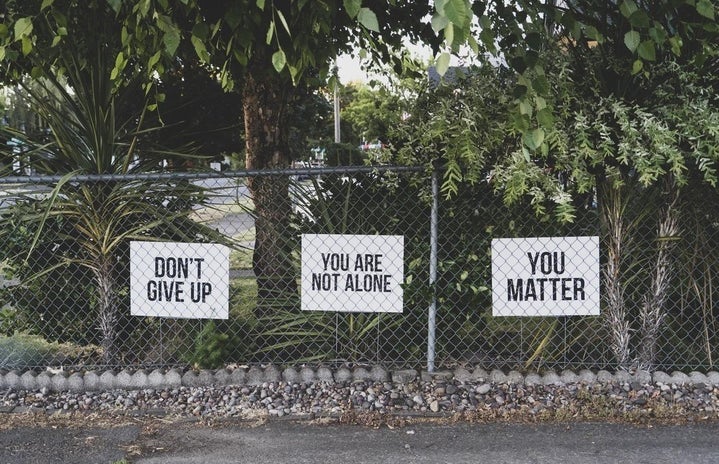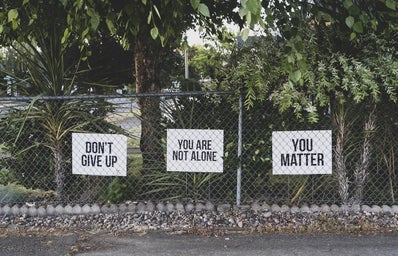I didn’t realize I was suffering.
What I was disguising as brief moments of sadness and low self-esteem turned out to be depression and anxiety. For the longest time, I dealt with my problems in silence. I refused to let anyone know what was happening in fear that I wouldn’t be understood. I was also afraid to share my struggles because I thought I could handle them alone. They were my problems anyway, so why bother others with them?
However, this thinking led to more worry, frustration, doubt, and pain – until the day came that my mind and my body couldn’t take it anymore. I soon realized that I needed help and that this was something that I couldn’t do on my own.
Sunday, October 3 to Sunday, October 9th, 2021 is Mental Health Awareness Week. There have been many events in light of this week to help those who struggle with their mental health and to help them get to a better place. At my school (Kennesaw State University) there were mental health fairs, virtual workshops, and even art and yoga classes.
In the past, I never bothered with learning more about my mental health because it seemed like something I didn’t have to deal with. I assumed that I didn’t have any issues because I had nothing to be upset about. Now, in my early 20s and wrapping up my undergraduate experience, I realize that taking care of my mental health is just as important as taking care of my physical health. While my mental health journey hasn’t been easy, I am taking it step by step and slowly working towards a mindful and improved well-being.
So far, here are some things I have learned through experience, professional help, and self-awareness. I hope these tips help you as well if you also struggle with anxiety, depression, or any other mental health problem you may have.
- Acknowledge that there is a problem.
-
Fredrick Douglass once said, “If there is no struggle, there is no progress.” This quote can be applied to many different situations, including dealing with mental health adversities. If you don’t realize that you are struggling, you won’t be able to get to a better state. You’ll just continue to suffer and wonder why.
Unfortunately, I had to learn this lesson the hard way. I knew I was upset and I knew I was hurting. But I didn’t seriously acknowledge that was anxious or depressed until I realized that it was affecting everything I did. I started to avoid my schoolwork and activities that I loved doing suddenly became uninteresting and I lost my passion for them sometimes. When I noticed this was happening, I realized that I did in fact have a problem and that I needed help. I had no idea how to describe my feelings and what I was going through. Speaking out about my problems has helped me realized so much about myself. I realized that I am not capable of solving every single one of my problems all alone. I realized that I had been holding back on being human (not talking, being emotionless, overworking myself – for example). The biggest thing I realized is that I had people on my side. My family and friends wanted to look out for me and encouraged me to seek help.
Once you acknowledge that you are facing difficulties, then your healing can start.
- Talk to people that care about you and will listen to you.
-
Once you’ve acknowledged that you’re going through something – talk to someone. This is something that I’m currently learning myself. I’ve always been someone that has difficulty opening up to others, especially when it came to my problems.
Whenever family and friends would ask if I was okay (and I genuinely was not), I would lie through my teeth and say that I was fine or I was doing good. I kept all my emotions inside and barely told anyone what I was going through.
When I had a mental breakdown, I also had a breakthrough of sorts. During my lowest and weakest moments, I finally expressed how I was truly feeling. I remember telling my parents that I was depressed and that I wasn’t doing okay. Hearing their words of comfort and advice immediately brought peace, and I felt better not holding in so much negativity inside of me.
Sometimes it may seem difficult to talk to others because automatically assume the worst. We fear we might get ridiculed, yelled at, ignored, or dismissed. But the reality is, sometimes we make these conversations out to be the worst things ever when they aren’t. Once we open up about we feel, we realize that the conversation actually went in the right direction. Your trusted individual listened, comforted you, and then offered you steps to move forward. You will feel so much relief when you’ve expressed your truth.
Note: Make sure the person you open up to is a TRUSTED individual, like a family member, a friend, a professor, or a colleague. These people know you the best and (hopefully) wouldn’t want anything bad happening to you- physically, mentally, financially, etc.
- Feel your emotions.
-
Speaking of emotions, I learned this next tip from my therapist and the workshops I’ve been attending. During my teenage years, I developed the philosophy of not crying, because crying showed weakness and I didn’t want to showcase that. So, if anything happened that would incite tears to flow, I forced myself to suck up my tears and keep it moving. I convinced myself that tears were not worth it.
Even going into college, I continued this belief of disguising my true emotions. If I was angry, I would calm down and try not to get overly upset – but the feeling ate at me for the rest of the day. If I was stressed, I tried to conceal it as best as I could – knowing that deep inside the stress was bothering me to no end. Hiding my true feelings was not helping me in the long run and easily contributed to more anxiety and depression problems. Hiding my emotions also affected how I saw other people and my interactions with them.
After talking with my therapist, I learned that holding in your emotions doesn’t help your progress. In fact, holding in your emotions doesn’t give you the opportunity to be a human being. Now, I’m working on expressing my emotions when I feel them at the moment. If I cry, I find a place of solitude and cry my eyes out. If I feel worthless, I read some positive affirmations that reaffirm my self-worth. Practicing this concept has helped me developed a better understanding of mindfulness and self-awareness.
Crying is okay. Feeling upset is okay. Allow yourself to feel what you feel and see what you can do from there.
- Be kind to yourself.
-
This is another concept that I am working on. One of the biggest struggles in my mental health journey is low self-esteem. Past trauma and false realities that I created caused me to believe that I was really worthless and that no one wanted to be around me. However, I realized that these negative headspaces were destroying me. I have people on my side. I have people that enjoy my company. I am worthy of being loved and loving myself. And even though I make mistakes, I’m not a lesser or terrible person for doing so.
I am a severe perfectionist and I never realized how much these tendencies affected me until this year. My perfectionist tendencies were controlling my life. Every time I made a mistake, I thought that I was disappointing everyone around me and myself. Every time I made a mistake, I automatically assumed that I was a terrible person and not holding up to my standards.
Because I repeated these things to myself, I have caused myself so much stress, pressure, and hurt that honestly could’ve been avoided and worked through. Now in the present, I’m focusing on being kinder to myself and realizing that there is no such thing as a perfect human being. Making mistakes is all a part of a life experience. All experiences (good or bad) is a chance for you to grow.
- Seek professional help.
-
My last tip is to seek professional help if things continue to get worse or if you want to see someone other than a trusted individual.
I decided to start getting therapy once I realized that I wasn’t understanding what was happening to me. I seriously had no idea why I suddenly lost my motivation and passion for things that I dearly loved. Even though I knew my parents would provide good advice, I also knew that they couldn’t have been my only way to get help.
If your university offers counseling and/or psychological services, take up your university on that offer. After almost four years, I finally took advantage of the opportunity. With my school, counseling services are already paid for in our tuition, so technically – meeting with my therapist is free and all students get up to 16 sessions in a semester. The only downside to this is that I can’t see my therapist on a regular basis, because the university can’t offer a private practice.
Meeting with my therapist has helped me learn new things about myself and how to better manage my anxiety and depression. She has also made me more comfortable in sharing my experiences and makes our sessions a safe space. If you can speak with a therapist, please do – as you will get help from an objective perspective.
Any mental health journey isn’t an easy one. But I hope that you will be kind to yourself and take it one day at a time. You got this!


